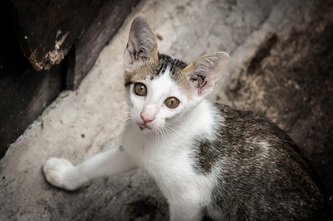Trap, Neuter and Return Program for Feral Cats
In February of 2009, Pawnee County Humane Society started a community wide program to control the feral cat population in Larned. Multiple studies have shown that TNR (Trap/Neuter/Return) programs are the ONLY effective way to control feral cats. PCHS wants the community to understand why we are taking this approach.
|
A feral cat is one that has returned to living like a wild animal. It was either born to a feral mother or was abandoned by previous owners. These cats are not tame and they are not house pets. These cats reproduce at astounding rates. One male and one female cat and their offspring can theoretically produce 420,000 kittens in 6 years.
Feral cats can reproduce until their population reaches maximum sustainability (all available resources are being used). This is why simply catching the cats and moving them to a new location or having them to put to sleep is not a long term solution. These methods of dealing with cats only ENCOURAGES them to breed faster; the opposite of what we want to accomplish. By spaying or neutering the feral cats and then RETURNING them to their neighborhood they hold their spot, but do not reproduce. This allows us to get ahead of the population. As we continue to spay and neuter the cats their numbers don't grow. Then, as nature takes its course, the population of adults begins to decline. TNR has been the only method proven to effectively control the feral cat population. PCHS believes that with community support we'll be able to make a difference. Cats that have been through the TNR program will be vaccinated for rabies, be spayed or neutered, and will also have the tip of one ear surgically removed. This will allow them to be identified as cats that have already been through the program so we don't take them to the vet a second time. These cats will also not exhibit the bothersome behaviors of unaltered cats. That means no tom cats fighting over females or marking their territory; no females in heat howling through the night, or having kittens in a garage or under a porch. Most problems associated with feral cats will be eliminated. PCHS believes that the Trap/Neuter/Return program is the best option for controlling the feral cat population. |

Feral cats are present in nearly all communities world-wide.
If you know of a feral cat colony that we can help, or would like to be a caregiver for a feral cat colony, please contact Chasitty Solko at 285-9387. The Feral Caregiver Agreement, available here in MS Word or here as a PDF (Adobe) , is an agreement we have with our caregivers (those who help monitor the feral cat colonies and provide food and shelter). |
